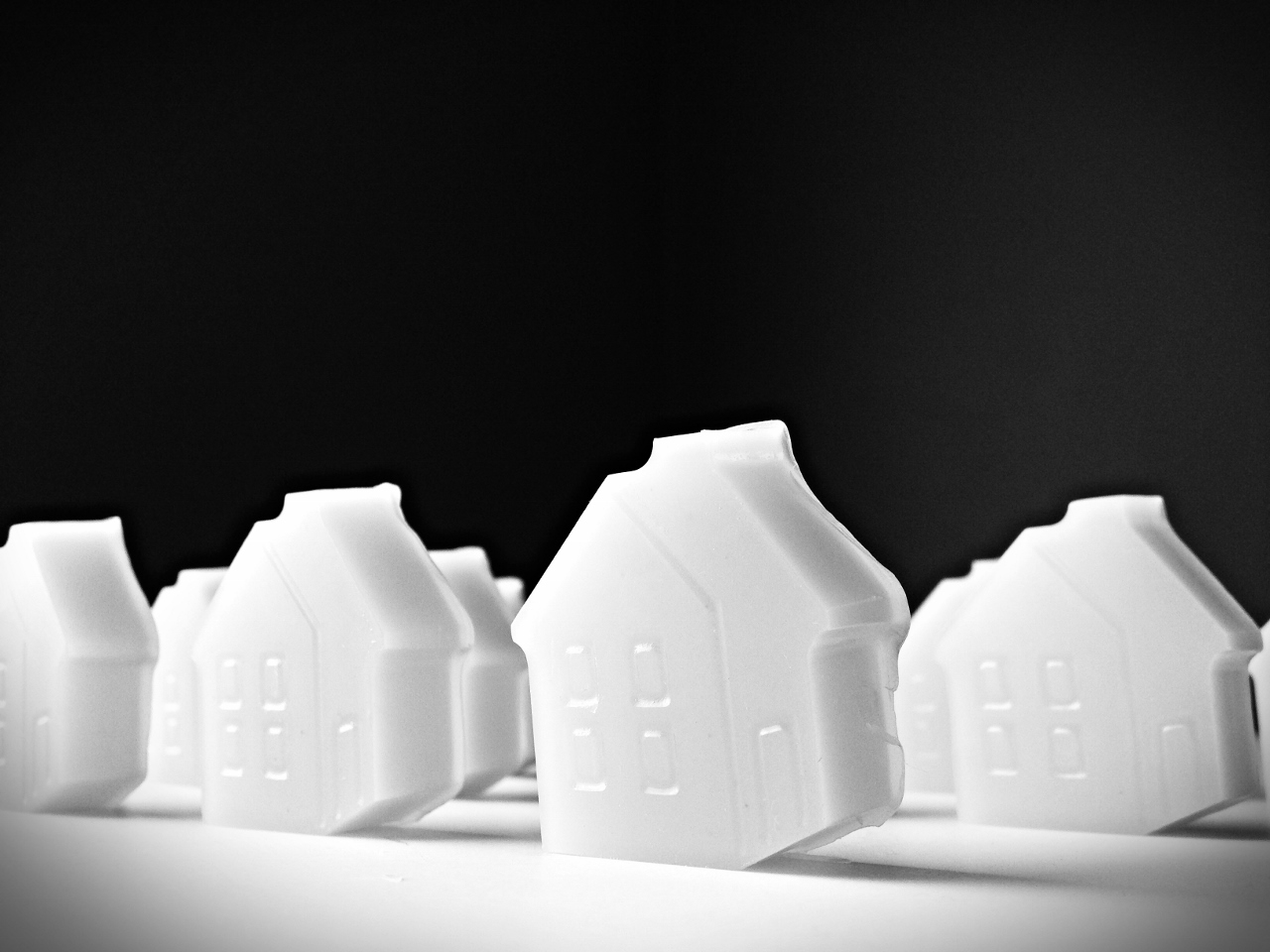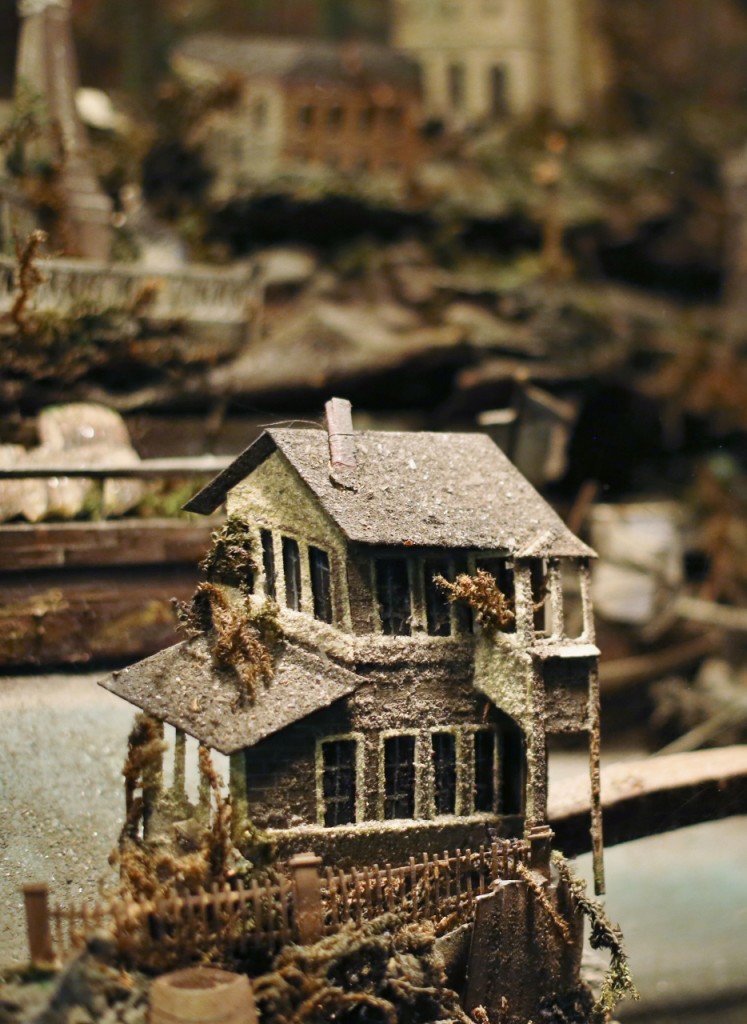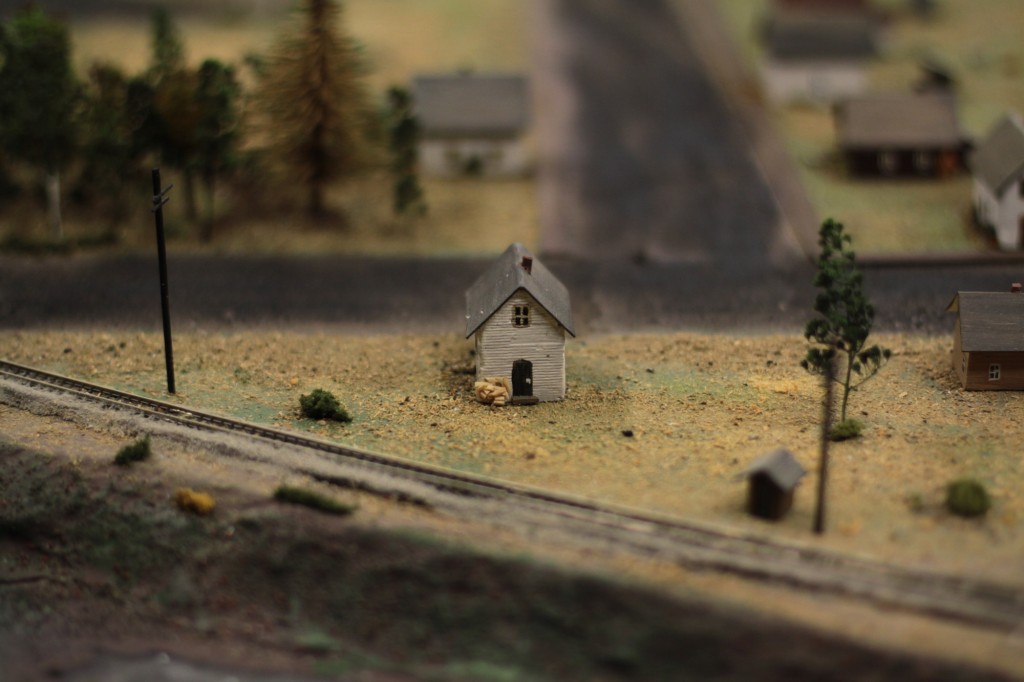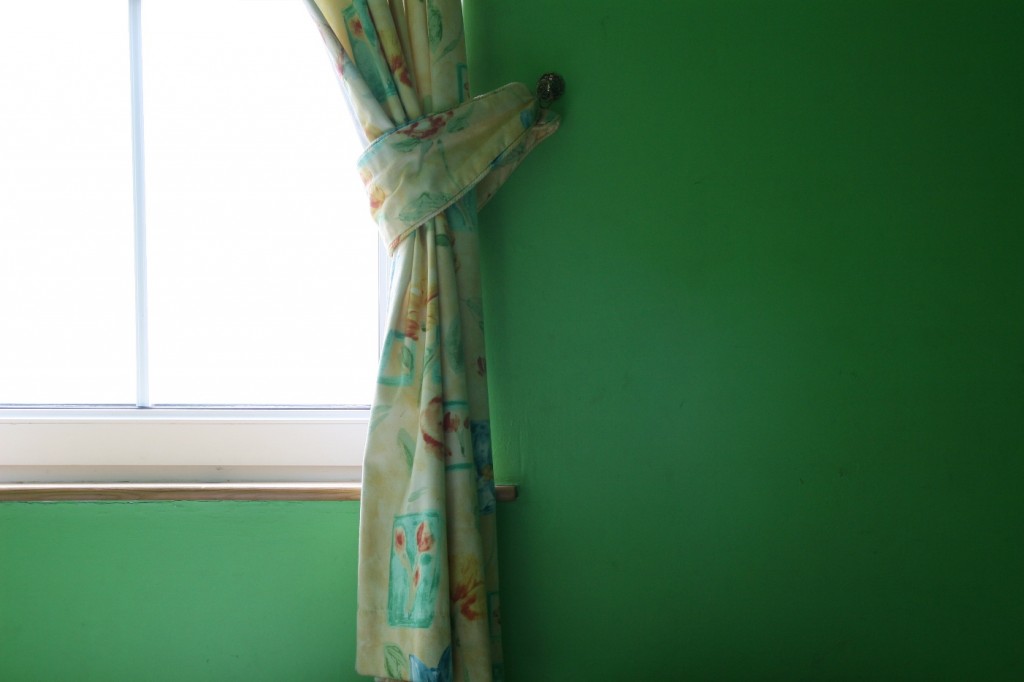
By María Joaquina Villaseñor
2006
Relief as I arrive at the rental office with moments to spare before it closes to pick up keys for my new home: an eleven-hundred square foot townhouse with a small backyard, a garage, and more space in the closets than I have stuff to fill closets with. I wonder if the large downstairs closet by the front door could be used as a study; I contemplate it seriously.
I furnish the town home with two tables, a small stone-colored couch, a rustic Mexican wooden television stand with shelving—all furniture that my mother and stepfather have given to me from their own home. My queen-sized bed is a hand-me-down I got from my sister; I’m pretty sure my niece was conceived on it.
About a year later, a friend from Berkeley, a former roommate, visits me there. After staying with me, she gossips to another friend that I still have all my furniture from grad school. I’m hurt since it is obviously not meant to be a compliment; but she’s not entirely wrong either. The décor of the townhome is more than a little patched together, the furniture worn and perhaps more starkly so against large, bright white freshly painted walls and new carpets. I want to paint the walls, but it’s a rental and I don’t want to lose my security deposit. Grad student poverty is still my day-to-day reality. But the new place is to me, palatial and above all, spacious with possibility.
I am 189 miles away from Sacramento where I was born, the furthest I have ever lived from that city except for the year I lived in Mexico as a girl. I am a new Assistant Professor at a public university on California’s central coast with a freshly completed a doctorate from UC Berkeley. I traveled from the Sacramento area in a caravan with my mother and stepfather in a small U-Haul truck, me driving the 1987 Volvo that my stepfather purchased for me for $750. I am twenty-nine years old, the Volvo is my first car, and I am a newly licensed driver. My mother and stepfather are doing all they can to help me. So many things are new.
2005
I’m embarking on a nationwide job search, and I interview at the University of Michigan in Ann Arbor. There, after actually complimenting the coffee at a restaurant in which we have dined, a graduate student accuses me of being a “Berkeley food snob.” She says: “People who come here from Berkeley are always like, ‘Oh, well, in Berkeley we have blah blah blah, and in Berkeley we have wah wah wah.’” Seriously—that’s exactly what she says.
If the apartment in which I live can be taken as any indication of the kind of status that enables one to become an anything snob, then this graduate student’s accusation is a verifiable impossibility. I live in a basement studio apartment of an old white Victorian home on Hearst Avenue, in Berkeley not far from campus. I select it solely on the basis of its location and the fact that it is “affordable.” It is not really affordable, since I have to take out roughly ten thousand dollars in student loans to afford it, but I’ve reached the point that many graduate students reach: I simply can not deal with the idea of having yet another roommate and have no idea how I will be able to write anything while having to negotiate others’ schedules and habits. I’ve been a student having student money problems and roommates for eleven years; I’m desperate to be done.
I should have known there is something up with the basement apartment when the landlord asks me to give him twelve postdated rent checks for eleven hundred dollars each when I sign the one-year lease. I have never signed a lease on my own before, and I understand Berkeley to have an odd and difficult rental market, so I agree to his request. After all, he says this is the only way to secure the apartment and make sure he doesn’t rent it to someone else. I give him over thirteen thousand dollars in postdated checks.
I’m sick almost immediately and this lasts pretty much the entire year. The damp, musty basement apartment grows molds and mildews in places I didn’t know mildew grew. As a child, I lived in some poorly ventilated homes and apartments; I’m used to the green black creep of mold on bathroom ceilings, to the mold that grows around window sills. But this apartment has that and more. I discover that mold is even growing in the one small closet in the apartment. My clothes begin smelling like mildew. A girlfriend tells me about a product called Damp Rid, a container of crystals that gets put in places where moisture leads to mold in order to absorb the dampness. I have no idea such a thing existed, and after complaining to the landlord who does nothing, I think I should give it a try. I have three containers of Damp Rid in different parts of the four-hundred square foot studio including in the musty closet. I write my doctoral dissertation next to containers of Damp Rid with a constant runny nose, itchy eyes, and allergy-induced headaches.
Some young men live in the flat above. I can’t tell if they’re students or if they do something else for work. I hear them exclaim, “Oooooh! Oooooohhh!” in loud unison about once a week. I imagine they are involved in some kind of weekly circle jerk and don’t really know what to think about that. I guess I’m curious about it but I mostly stay away from them. Eventually, I figure out that they’re vociferously playing video games. A disappointment. I have a very regular writing routine and remember every day that I moved to the Hearst Avenue basement apartment because I didn’t want the noise or the distraction of roommates. One day, I begin to hear hammering right outside my window. I try to tune it out and don’t worry about it much until the hammering goes on day after day. I am distracted and irritated. I see that my neighbors are building something brown and hairy on the back of a truck. Over the next few days, it begins to take shape…some kind of an animal. A…Snuffleupagus? On a truck? One day, I ask them about it. And that is how I learn about Burning Man.
I think I will be happy and in better health once I move out of the Hearst Avenue basement apartment, but the move takes place abruptly. I file my dissertation on a Friday afternoon in May, and my grandmother dies the day after on Saturday morning. My deceased grandmother is in Mexico, and though it’s time for me to move out of my Berkeley basement apartment, I leave suddenly and take a flight to Guadalajara to accompany my mother to my grandmother’s wake. After the wake and after my grandmother is cremated, we transport her ashes to Ciudad del Carmen, my grandmother’s hometown and the place where my mother was born and raised.
Back in Berkeley, at move-out time, my stepfather and my sister pack the contents of my apartment into a small U-Haul truck. I tell my twin sister where the cigarettes I hide are, and all the things I do not want my stepfather to see; as always in my life, I entrust her with my secrets. I leave the apartment with a little clothes, a certificate attesting to the completion of the requirements for my doctoral degree, and some uncertainty about the future though I am certain I will not return to that mold-infested place. I’m grief stricken, exhausted, worried about my mother, missing my grandmother already, and overall considerably less happy and healthy than I thought I would be at this moment.
1999
I’ve walked by the 1970s era building thousands of time since I moved to Berkeley in 1995. There’s a storefront on the bottom floor and the store sells Turkish rugs, beaded jewelry, baskets, and other imports. The building is pretentiously called “The Glen Building” and it has a top floor studio apartment that I rent with he who is my first serious long term romantic partner. I’m twenty-one and just learning about what that means. The studio apartment interior is very basic and has fresh paint and a new carpet, the way I hope and expect a rental will have. The carpet has very little padding and matches the 1970s industrial storefront feel of the building. It has a full but very tiny kitchen with a sliding door onto a balcony with a view of the Bay Bridge far in the distance. We move in a queen bed that’s just a mattress and a bed frame with no headboard and an old red easy chair and a table from my parents’ house. While we live in that place together, my partner Ryan and I travel to Mexico, the first time I have ever taken a love there. After returning from Mexico, I make a complete travel scrapbook including ticket stubs, stickers, and countless photographs of us with cousins, aunts, and uncles, on the Zocalo, at la Casa Azul, in Coyoacán, in Xochimilco, in so many magical Mexican places.
I want our studio apartment in the Glen Building to be more like Mexico. We paint the bathroom Frida Kahlo blue and the kitchen a Mexican avocado green. The painting of the kitchen and the bathroom is an investment and a grownup undertaking both because of the effort and because of the cost involved between the painting supplies and the forfeiting of the deposit money. There is a basketball hoop over the sole closet door in the apartment. The closet is not like a regular bedroom closet. It’s very small—more like a hall closet or linen closet. I share it—happily—with Ryan, and we jam our clothes in there and do not complain. I have a bad habit of leaving my wet towel on the bed when I get out of the shower. It is one of only two things that Ryan ever seems unhappy with me about. The other is that I sometimes go on and on talking, and I don’t listen to him very well. I stop leaving my wet towel on the bed and learn to be a better listener.
I learn to fry tofu, I learn to make soups, I learn to use a rice cooker. We host friends sometimes overnight, even though we have no separate guest room or even a futon. One of our friends, a fellow undergraduate, and also poet, gambler, and sports fan, stays with us several times, sleeping on our floor next to us in the queen bed with no headboard in which I learn about what it means to have an adult sexuality. Another friend comes out to me in the stairwell outside of the apartment, confesses that the protagonist of the sex and romance stories he has told me is a man, not a woman as he had made me believe. I’m unfazed; we’re figuring things out and finding our way. We host parties in our cramped studio apartment and create traditions. One of these new traditions is hosting Christmas dinners the week before we leave for our respective families’ holiday gatherings. It’s a way that I can make sure I have a good Christmas. I make roasted legs of lamb and experiment with cooking other things that are brand new to me and like nothing we ate in the homes in which I grew up. With Ryan, I learn what it means to create a chosen family; we flirt with being a family of two ourselves. For the first time in my remembered life, I share a home with a man with whom love and safety are feelings I have all the time and in abundance. I am free.
1992?
We live in a rented house in a suburb of Sacramento on Ash Street, having returned from a year of living in Ciudad del Carmen just the year before. The house is a boxy, light brown two-bedroom house where I live with my stepfather, mother, twin sister, and my two younger brothers—sweet, rascally, fun, little boys. My twin sister and I miss living in Mexico and long for the embrace of my mother’s family, the literal and figurative shelter they give us.
Between, say 1984 and 1995, I live in at least six different rental homes and apartments excluding the year we live at my grandparents’ house in Mexico. In one of the apartment complexes where we live, my mother and stepfather are the resident managers, living rent free in exchange for being the on site go-to people for our neighbors in the apartment complex. A Korean family who own a donut shop are our upstairs neighbors there. The woman of the household teaches my mother to make kimchi and they sometimes bring us fresh donuts from their shop. Some of our homes have unfinished floors. Some of our homes have roaches. All of our homes have holes that my stepfather has punched into doors and walls.
The holes in walls sometimes get covered and repaired, but they sometimes stay—or multiply—while we live in those places. The holes in the wall remind me of the imminence of the “cocos”—what my stepfather calls the knuckle punches on the head he gives us—that is his most frequent physical punishment of us kids. For a while, we are hit with the hard, grey plastic handle of a paddle for a raft I only vaguely remember us owning. But I do remember the raft paddle … its sting, its heft, the fear it inspires even after the welts were gone. There are slaps, too. Hair pulling. I believe, hope, pray that my mother will make it stop.
But she is being hit, too. The sounds of my mother and stepfather’s yelling and arguments are often preludes to sounds of thuds and later to the sight of my mother’s eyes—red and bleary and puffy from crying—or to the mark of welts or bruises on her. Occasionally I see a ripped blouse from her being pulled, yanked on, or dragged. My sister and I learn to drown out the sounds by turning up the volume on the TV. Against reason, we hope our little brothers do not hear what we’re hearing, do not see what we’re seeing.
Once my mother has us pack a few things as we flee to a battered women’s shelter—a “safe house.” I do feel safe in that house though I’m also scared that my mother will go back to my stepfather. Which she does. In the safe house, I desperately want my brothers to somehow feel like things are okay and normal. Though the hand-me-down towels, sheets, and other kids’ hand-me-down stuffed animals point to the anything-but-normal nature of our situation. One of the rules of the safe house is that no one is permitted to give out its phone number and address to preserve the secrecy, anonymity, and so the thinking goes, the safety of the women and their children. We can’t tell anyone where we are or how to reach us. It does not feel normal.
2017
Today, almost thirty years later, I long to remember the faces or names or stories of others who were in that safe house with us, experiencing something similar. But I don’t. We were there just a few days and I was preoccupied with our own situation, where we would go after. It turned out to be that where we went after was the same house we had left. After that, there were promises of no more beatings, which was a promise he mostly kept. After eight years or so of much torment, he (for the most part) stopped hitting us all, instead sticking to yelling, punishing, general volubility, and the maintaining of a home environment where walking on eggshells was the norm.
Of course, we kids did sometimes have fun and experienced joy in our childhood family homes, but these feelings were rented, and we were always aware that we could be evicted from joy at any minute. My siblings and I continued to be kids together until my sister and I moved away to college; we loved and still love each other with the passion of people who know that sticking together is survival.
I’m now a tenured professor, a wife, and a mother of twin daughters. I married my husband just over two years ago, on a beautiful, sunny afternoon on a beach in Maui aptly named Baby Beach since we spoke our vows with our two babies by our side with no other family present. In the midst of our wedding planning, and after thirty years of marriage, my mother and stepfather were in the middle of a bitter divorce the dregs of which I could not bear to have at my wedding.
Beside a shimmering Pacific Ocean, my groom read poems I saw him write on the plane ride without knowing what he was writing. We had one friend in attendance, a dear mutual friend and colleague we learned would coincidentally be in Maui at the time of our wedding. Our friend valiantly did quintuple duty—as our sole guest, videographer, on-site child safety specialist, best man, and maid of honor. I marveled at our luck. Actually, I marvel at my luck every day, as the man with whom I share my home and life shelters me with love, harmony, and understanding, opening my eyes daily to all that is possible for me, for us, for our life together. What is this happiness that I dare to call my own, beyond all my younger self could have imagined?
For the first time in my life, I live in a home that is not a rental home though it is in the same campus housing complex where I moved as an Assistant Professor just over ten years ago. The home I bought with my husband is only slightly bigger than the home I rented just over ten years ago on my own. Not long after we moved in, my husband and I went to the furniture store and bought a brand new couch and coffee table, another first for me. We didn’t buy an expensive couch because we have two small children who spill and stain things the way small children do, but it’s probably still the nicest couch I have ever had.
Last month, my youngest brother hand delivered a letter from my stepfather. The letter was sort of a group letter—asking for reconciliation with my mother, with my siblings, and with me. My name was written on the envelope in handwriting I will always recognize, but there was no address on the envelope under my name. My stepfather has never seen the first and only home I have owned, and does not know where I live. Sometimes the dull ache of the past tugs, but peace reigns in the home I have made, and I relish it.
•••
MARÍA JOAQUINA VILLASEÑOR is a professor of Chicanx/Latinx Studies at California State University, Monterey Bay. She is a co-author of The Historical Dictionary of U.S. Latino Literature, and an essayist whose writing has been published in Remezcla and The Acentos Review.

 Follow
Follow



